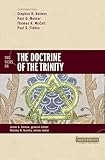Two views on the doctrine of the Trinity / Stephen R. Holmes, Paul D. Molnar, Thomas H. McCall, Paul S. Fiddes ; Jason S. Sexton, general editor.
Material type: TextSeries: Counterpoints. Bible & theology.Description: 233 pages ; 21 cmISBN:
TextSeries: Counterpoints. Bible & theology.Description: 233 pages ; 21 cmISBN: - 9780310498124
- 0310498120
- 23 231.044 S518T
- BT113 .T89 2014
| Item type | Current library | Collection | Call number | Status | Date due | Barcode | |
|---|---|---|---|---|---|---|---|
 Books
Books
|
SAIACS General Stacks | Centre for South Asia Research (CSAR) | 231.044 S518T (Browse shelf(Opens below)) | Available | 055288 |
Browsing SAIACS shelves, Shelving location: General Stacks, Collection: Centre for South Asia Research (CSAR) Close shelf browser (Hides shelf browser)

|

|

|

|

|

|
No cover image available | ||
| 231.044 M395T The triune God : | 231.044 M512H Hilary of Poitiers on the Trinity : | 231.044 M596T Trinitarian soundings in systematic theology / | 231.044 S518T Two views on the doctrine of the Trinity / | 231.044 S829G God's last metaphor : | 231.044 T236P Pannenberg on the Triune God / | 231.044 W341L Let God be God |
Includes bibliographical references and indexes.
Classic trinity : evangelical perspective -- Classic trinity : catholic perspective -- Relational trinity : creedal perspective -- Relational trinity : radical perspective.
The doctrine of the Trinity stands front and center of the Christian faith and its articulation. After a sustained drought of trinitarian engagement, the doctrine of the Trinity has increasingly resurged to the forefront of Evangelical confession. The second half of the twentieth century, however, saw a different kind of trinitarian theology developing, giving way to what has commonly been referred to as the "social Trinity." Social -- or better, relational -- trinitarianism has garnered a steady reaction from those holding to a classical doctrine of the Trinity, prompting a more careful and thorough re-reading of sources and bringing about not only a much more coherent view of early trinitarian development but also a strong critique of relational trinitarian offerings. Yet confusion remains. As Evangelicals get better at articulating the doctrine of the Trinity, and as the current and next generation of believers in various Christian traditions seek to be more trinitarian, the way forward for trinitarian theology has to choose between the relational and classical model, both being legitimate options. In this volume, leading contributors -- one evangelical and one mainline/catholic representing each view -- establish their models and approaches to the doctrine of the Trinity, each highlighting the strengths of his view in order to argue how it best reflects the orthodox perspective. In order to facilitate a genuine debate and to make sure that the key issues are teased out, each contributor addresses the same questions regarding their trinitarian methodology, doctrine, and its implications.
There are no comments on this title.

